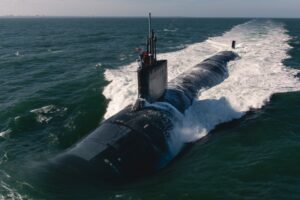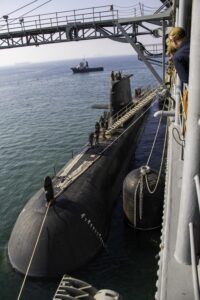The Senate Armed Services Committee’s final fiscal year 2024 defense authorization bill included several provisions to add oversight to the AUKUS agreement to help Australia gain nuclear-powered attack submarines.
One provision of the Senate’s FY ‘24 National Defense Authorization Act bill would require the Secretary of Defense designate a senior DoD civilian official to be responsible for overseeing department activities related to AUKUS activities within 90 days of the bill’s enactment.

The AUKUS agreement aims to have the U.S and U.K. help Australia develop the capability to field and build nuclear-powered attack submarines (SSNs), starting with several Virginia-class submarines purchased from the U.S. in the 2030s.
DoD is also directed to submit an implementation plan outlining all DoD efforts related to AUKUS to congressional committees.
The bill said the plan should include timelines, major anticipated milestones for AUKUS implementation, identification of the dependencies of the milestones on defense requirements unrelated to AUKUS and solely within the decision making responsibility of Australia or the U.K., recommendations for adjustments to statutory and regulatory export authorities or frameworks needed to implement AUKUS, a consideration of the implications of the plan on the industrial base, a plan to improve information sharing, and a plan to leverage relevant existing cybersecurity or technology partnership or cooperation activities among the U.S. and U.K. or U.S. and Australia.
The committee also seeks semi-annual briefings to the defense committees on all DoD activities implementing AUKUS starting 60 days after the plan is submitted and then occurring every April 1 and Oct. 1 through 2029.
Elsewhere in the bill report, the committee said it “strongly supports” AUKUS but underscored the importance of ensuring enough attention is given to the Australian submarine industrial base and their shipyards to make sure they can meet the demands of maintaining SSNs.
Therefore, the committee directed the Secretaries of Defense and the Navy to provide a report to Congress by Jan. 30, 2024 on DoD efforts and plans “to leverage the expertise of the United States public shipyards, including lessons learned as part of the ongoing Shipyard Infrastructure Optimization Plan, to support Australian shipyard improvements and worker training.”
Separately, on July 13 chairman of the Senate Foreign Relations Committee (SFRC) Bob Menendez (D-N.J) and Sen. Tim Kaine (D-Va.) revealed the SFRC approved the transfer of Virginia-class SSNs to Australia for AUKUS as part of the FY ‘24 State Department authorization bill as an amendment during the committee’s closed markup that day.

The provision specifically authorizes the transfer of two Virginia-class submarines from U.S. stocks and authorizing a third new build boat via Foreign Military Sales (FMS), the president to accept funds from Australia for an AUKUS Submarine Security Account, and the export of defense services to help Australian private sector personnel develop the needed industrial base.
The provision also would establish a State Department AUKUS senior reporting directly to the Secretary of State, grants Australia and the U.K. priority status within the FMS process with advanced clearance to transfer AUKUS-related technologies to Australia and eases granting an exemption to commercial export controls for Australia and U.K., if the Secretary of State certified their export control regimes are comparable to the U.S.
“This amendment in the State Authorization Act of 2023 provides Australia with a conventionally-armed, nuclear-powered submarine capability and streamlines the export of U.S. military technology, while ensuring that technology is safeguarded from adversarial espionage,” Menendez said in a statement.
The prime contractor for Virginia-class submarines is General Dynamics’ Electric Boat [GD], which works with HII [HII] as a subcontractor to split the work.
The Navy currently seeks to buy two SSNs annually, although the shipyards are not yet able to deliver at that rate.
Last month, three House Democrats introduced the AUKUS Undersea Defense Act that would authorize the president to transfer two submarines to Australia and other associated legislative changes in to aid the AUKUS agreement (Defense Daily, June 9).
That bill is in response to the Defense Department’s three legislative proposals from May to allow the transfer of two submarines, accept Australia funds to improve the submarine industrial base or acquire submarines, and allow private sector Australian personnel to be trained by U.S. Navy and contractor personnel (Defense Daily, May 18).
One of the sponsors of the AUKUS Undersea Defense Act, Rep. Joe Courtney (D-Conn.), welcomed the Senate’s approval of these provisions.
“Today’s bipartisan action on legislation to authorize AUKUS is good news and a great step towards making this trilateral security agreement a reality. In particular, Senators Menendez and Kaine deserve great credit for their leadership crafting this measure. I hope their example will inspire similar action in the House Foreign Affairs Committee,” Courtney said in a statement July 13.